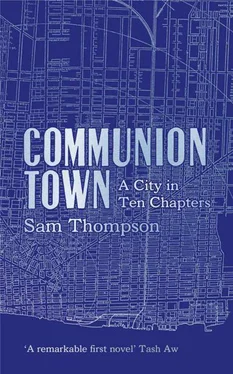‘Much later I learnt what took place on that walk home.
‘The desertion gave a kind of intimacy to the streets, as if the city were one huge interior through which he alone had access. Strong moonlight painted everything with a grey-green pallor: the wet pavements, the trees branching like lungs and carrying the malignancies of birds’ nests, the high walls of the old houses, the frosted ceiling of cloud.
‘He first caught sight of the figure as he passed an abandoned warehouse. It was some distance away, picking its way across the weeds and concrete of an empty lot. It moved with a curious, broken gait, stooped over as if it might be in distress, and Dilks paused. He almost called out to ask whether he could help; but he hesitated, and said nothing. The figure’s face was blank with shadow, but it gave the impression of gazing directly at him. He walked on.
‘A few minutes later he knew that it was following. When he stopped to listen, he could hear an irregular footfall, like someone waltzing drunkenly and alone through the alleys. He redoubled his pace, but when he glanced over his shoulder a slender pale shape was moving in the ashy-green darkness. There could be no doubt now of what was close behind him. But what could he do except keep walking, hoping that he would find himself suddenly at home and that this walk, which seemed as though it might last forever, would dissolve as though it had never happened in the brightness of their room?
‘He didn’t glance back a second time. But the odd, slow footsteps, somehow more suggestive of three legs than of two, kept drawing nearer, and soon he knew that it was treading on his heels. He knew that, if it liked, it could have laid its fingers on his shoulder. At the idea his legs weakened and he staggered into a doorway for support.
‘Turning, he found himself facing it. He was never able afterwards to describe what it looked like. He could only say that he pitied it a great deal. It stood there for a long moment, as if it needed help but couldn’t bring itself to ask. Then it leant up to him, closer, until it was only inches from his averted face, and, softly, it began to speak.
‘It told him a secret. A story about itself, that was what it told him. Later, the details of what had been said escaped him completely. All he could remember was wishing desperately not to hear, and knowing that nevertheless the words were slipping into his ears, soaking down deep, never to be recovered.
‘At last it drifted glumly away. He thought that, before it went, it reached out and brushed his shoulder affectionately, or plucked away something small — a loose thread from his coat. The encounter had lasted minutes at most.
‘He was shaken, but he pulled himself together and made it home. As he climbed the stairs he found that he was bright-eyed, light on his feet, fingers twitching. That story had trickled down like rainwater, out of reach. He had already forgotten what it was he had heard. He was ready for a strong restorative. He was excited, if the truth be told. Certainly it had been a peculiar incident, but he couldn’t wait to tell Poppy. Once he talked it over with her, he knew, that meeting would become the well-shaped tale of a night’s minor misadventure, seriocomic, perhaps mock-heroic: telling it over between them, they’d settle what it meant. It would become an amusing demonstration of how even the most hard-headed of us were prey to strange frights when out late in lonely places, and of how all those stories about this side of town were laughably exaggerated. She’d be asleep by now. He wondered if he should wake her, so that he could tell her tonight.
‘He put his key to the latch. It didn’t seem to fit. He tried again, but it refused to go in. He examined the key, but it didn’t appear to be damaged, and the lock, too, looked the same as ever. Eventually he knocked on the door, and, as it opened to Poppy’s sleep-fuddled face, he stepped forward, offering an apologetic embrace.
‘But Poppy didn’t move into his outstretched arms. Instead, her sleepy eyes snapped wide and she shrank away in sudden panic. She tried to force the door shut on him, but he was already inside the flat, and seeing that he was now halted with confusion and was not to be expelled, she retreated to the far side of the cramped attic with one hand pressed to her belly and the other feeling blind across the countertop of their tiny kitchen. She stared at him with no trace of recognition in her face. Her voice shook as she asked what he was doing in her home.
‘It seemed to Dilks that he had missed a step between sleeping and waking, and had slipped into a bad dream. He had never seen such expressions on her face before. He tried to speak calmly in spite of the hysteria that all at once had a hold of his innards. She was backed hard against the counter, edging along towards the cutlery drawer. She thought he was an intruder. He wanted to shout till his lungs were ragged that she was wrong — that, if this city were a thousand cities, there would still be none in which the two of them were strangers.
‘He reminded her who he was and where they were, and took a cautious step towards her. She kept still, but her eyes danced, mad to get out. He took another step towards her and she shrieked, clawed the drawer open and snatched out a carving knife. He raised his hands carefully, but when she shrieked a second time and slashed at him, he found himself grabbing one of their cheap wooden chairs by the back and swinging it to keep her off. She screamed at him to get out, get out, get out of her home.
‘Well, they went at each other for a long while, that night, screaming and yelling all round the room with the carving knife and the smashed-up chair. The neighbours must have had to bury their heads under their pillows. There wasn’t much left of the flat by the time they’d finished. But at last he tottered out to the street in the first shade of dawn. There was nothing more to say, no argument left to have with this woman who claimed that he was a lunatic and that she’d never seen him before he forced himself through her front door. So he made his way back to his unfinished café, let himself in, and poured himself a drink with a jumping hand. And he’s been here ever since.’
The five of us shifted in our seats. Dilks, slumped in his usual position, watching a puddle of rainwater quiver sluggishly larger on the bartop, didn’t seem to have heard anything of what had been said. Briggs lit his second cigarette, took a drag, and rested his hand on the table. A scribble of bluish smoke climbed from his fingers. I looked over at the windows, which by now were streaked with condensation.
‘But they say it takes everyone differently,’ Briggs said. ‘Who knows. Perhaps your friend will have no trouble.’
Something hit the window. We saw the flattened palm of a hand. It lifted away, then slapped the glass again. We all sat uselessly for a moment. Then one of the newcomers leapt up and wrenched the street door open. There was a red mark on the windowpane.
We were all on our feet. The young man came in unsteadily, with his jacket hanging open, confused. His mouth worked dumbly. Then his legs gave way and he fell against the wall, one of his arms twitching. The two young men caught him before he could collapse, and led him to a chair. One arm of his jacket was ripped and the blood was sticky on his hand, but examination revealed only a dirty, shallow graze on his palm and forearm, as if he had fallen on tarmac. We couldn’t work out where all the blood had come from.
His lips trembled and great shivers went through his limbs. He didn’t seem to know where he was. Something had changed about his eyes, leaving them incredulous and emptied-out. He looked to me like someone who had lived a century in a single night, or travelled impossible distances without meeting another living soul.
Читать дальше
Конец ознакомительного отрывка
Купить книгу












